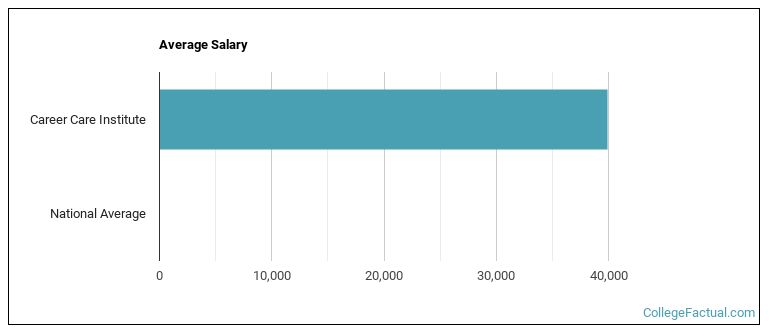 by our College Data Analytics Team
by our College Data Analytics TeamExplore the best ranked schools for the programs you are most interested in.
Career Care Institute was not ranked in College Factual's Best Overall Colleges report this year. This may be because not enough data was available.
Career Care Institute has an open admissions policy, so you should not have much trouble being accepted by the school. Still, it is important to fill out the application completely and submit any requested materials, which may include proof that you have a high school diploma or the equivalent.
The student to faculty ratio is often used to measure the number of teaching resources that a college or university offers its students. The national average for this metric is 15 to 1, but at Career Care Institute it is much better at 12 to 1. That's good news for students who want to interact more on a personal level with their teachers.
In addition to the student to faculty ratio, some people look at what percentage of faculty members are full-time as a sign of how much time professors will be able to spend with their students. This is because part-time teachers may not be be on campus as much as their full-time counterparts.
The full-time faculty percentage at Career Care Institute is 64%. This is higher than the national average of 47%.
The freshmen retention rate is a sign of how many full-time students like a college or university well enough to come back for their sophomore year. At Career Care Institute this rate is 59%, which is a bit lower than the national average of 68%.
During the 2017-2018 academic year, there were 549 full-time undergraduates at Career Care Institute.
| $0-30 K | $30K-48K | $48-75 | $75-110K | $110K + |
|---|---|---|---|---|
| $42,937 | $40,812 | $41,227 | $44,238 | $44,606 |
The net price is calculated by adding tuition, room, board and other costs and subtracting financial aid.Note that the net price is typically less than the published for a school. For more information on the sticker price of Career Care Institute, see our tuition and fees and room and board pages.
Almost 66% of college students who graduated with the class of 2018 took out student loans, but that percentage varies from school to school. At Career Care Institute, approximately 79% of students took out student loans averaging $7,128 a year. That adds up to $28,512 over four years for those students.

See which majors at Career Care Institute make the most money.
Get more details about the location of Career Care Institute.

Contact details for Career Care Institute are given below.
| Contact Details | |
|---|---|
| Address: | 43770 15Th Street West Ste 115, Lancaster, CA 93534 |
| Phone: | 661-942-6204 |
| Website: | www.ccicolleges.edu/ |
| Most Popular Majors | Bachelor’s Degrees | Average Salary of Graduates |
|---|---|---|
| Practical Nursing & Nursing Assistants | 142 | NA |
| Allied Health Professions | 31 | NA |
| Nursing | 27 | NA |
| Allied Health & Medical Assisting Services | 20 | NA |
| Dental Support Services | 10 | NA |
Footnotes
*The racial-ethnic minorities count is calculated by taking the total number of students and subtracting white students, international students, and students whose race/ethnicity was unknown. This number is then divided by the total number of students at the school to obtain the racial-ethnic minorities percentage.
References
More about our data sources and methodologies.